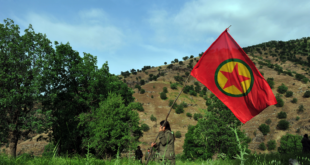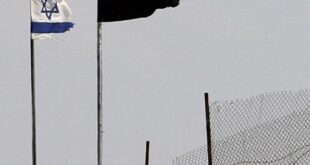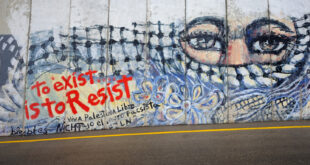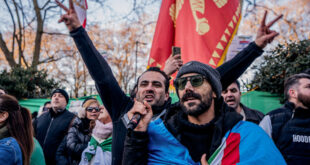BEIRUT — A month after a UN resolution halted fighting between Israel and Hizbollah, the ceasefire appeared strong Thursday with Israeli troops continuing to withdraw from south Lebanon and UN peacekeepers fanning out across the war-ravaged region.
But tension was simmering under the so far robust truce: Hizbollah accused Israel of “flagrant†ceasefire violations and said its fighters were still present in southern towns near the border with Israel.
The UN has asked Israel to pull down a barbed-wire fence Lebanon said encroached on its territory and said Thursday it would issue a complaint to Israel’s army after four overflights by its jets in Lebanese airspace, in violation of the ceasefire.
Still, UN officials expressed optimism on Thursday’s one-month anniversary of the halt to hostilities that left more than a thousand dead and obliterated Lebanese infrastructure in 34 days of clashes.
“The good news is that the cessation of hostilities is holding up very well,†said Alexander Ivanko, spokesman of the UNIFIL peacekeeping force based in the southwestern Lebanese town of Naqoura. “The situation is still tense, but it is stable.†Israeli forces, which at their peak numbered 30,000 troops and penetrated 30 kilometres into south Lebanon, have largely pulled back to a three to five kilometre band along the border, Ivanko said. Israel said about a week ago it would pull all its troops out within a fortnight.
Meanwhile, under a beefed-up Security Council mandate, troops from France and Spain were expected to move into the war-weary south within the next few days to reinforce the peacekeeping mission, joining the UNIFIL force now made up mainly of Italians, Ghanaians and Indians.
The UN force is now about 3,800-strong and should reach close to 5,000 by the end of the week — a third of its eventual size.
A top Hizbollah figure said Thursday the group was exercising “self-restraint†in the face of Israel’s “flagrant violations†of the UN resolution and urged the international community to implement the resolution.
“There is no ceasefire. There is only a cessation of hostilities which Israel is violating every day by annexing some Lebanese territory, kidnapping Lebanese citizens and firing at Lebanese fishermen,†Sheik Hassan Izzeddine, Hizbollah’s senior political officer in southern Lebanon, told the Associated Press.
Lebanese Prime Minister Fuad Siniora protested the 15-metre wide barrier’s encroachment along the “Blue Line†— the United Nations-demarcated border between the two countries but Israel on Wednesday denied it was on Lebanese soil.
Hizbollah leader Sayyed Hassan Nasrallah said in an interview aired late Wednesday that Israel’s monthlong bombardment had failed to dismantle Hizbollah, and said his fighters were still in towns and villages along the border with Israel.
“We are present on the border [with Israel]… Now the war is finished. There is no demilitarised zone south of the Litani [River]. The resistance [Hizbollah] is present south of the Litani and is present in all of south Lebanon,†Nasrallah told Al Jazeera television. The Litani is 30 kilometres north of the Israeli border.
Apparently referring to multinational troops tasked under the UN resolution with setting up a buffer zone between Israel and the fighters in south Lebanon, Nasrallah said, “No-one can stop us from being in our land to defend our land, our honour and the dignity of our country.†Nasrallah’s comments highlight a challenge faced by the UN peacekeeping force in Lebanon.
Hizbollah fighters, who have controlled parts of south Lebanon for years, are believed to be lying low and blending in with the local population — as they did before the war.
Although the UN-brokered ceasefire resolution calls for Hizbollah to eventually be disarmed, the peacekeepers deploying in the south do not have a mandate to search out weapons.
The beefed-up international force, which is to reach 15,000 troops, is expected only to confiscate weapons if they are openly carried, to avoid confrontation. The Lebanese army, also with 15,000 soldiers in the area, will not try to disarm Hizbollah, the Lebanese government has said.
Israel launched its military campaign on July 12 after Hizbollah fighters captured two Israeli soldiers in a cross-border attack that also killed three Israeli soldiers. In addition to targeting Lebanese infrastructure, Israeli warplanes and artillery pounded Hizbollah strongholds south of Beirut and in eastern and southern Lebanon, in an attempt to destroy the group’s rocket arsenal.
Hizbollah responded by firing more than 4,000 rockets on northern Israel.
More than 850 Lebanese were killed, mostly civilians, and almost 160 Israelis died.
The UN resolution, passed by the Security Council on August 11, halted hostilities three days later.
The war was widely seen in Israel as a failure, in part because the military did not crush Hizbollah and was unable to stop rocket attacks on northern Israel during the fighting.
On Thursday, Amnesty International accused Hizbollah fighters of breaking international humanitarian law by firing thousands of rockets into Israel and killing dozens of civilians during the war.
 Eurasia Press & News
Eurasia Press & News



